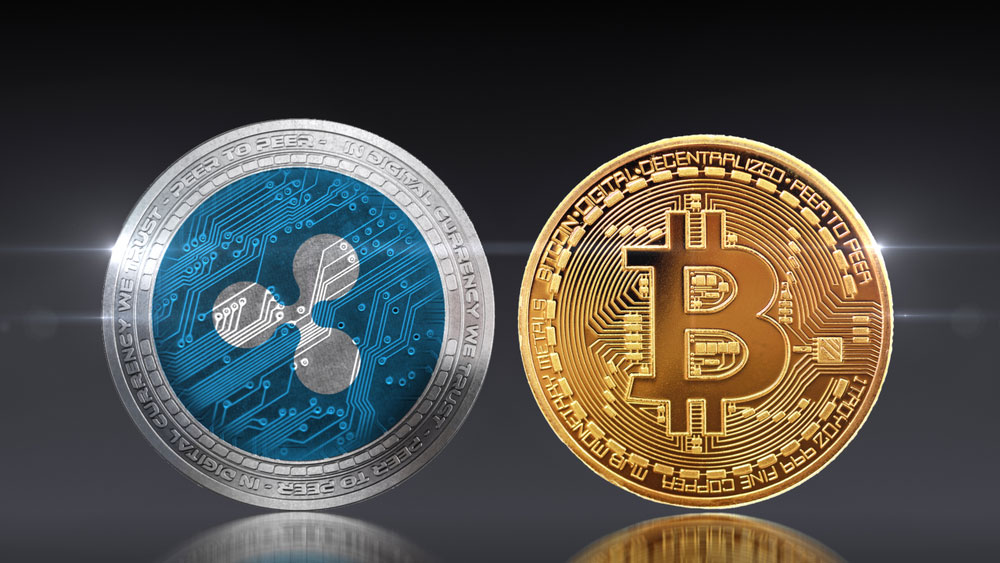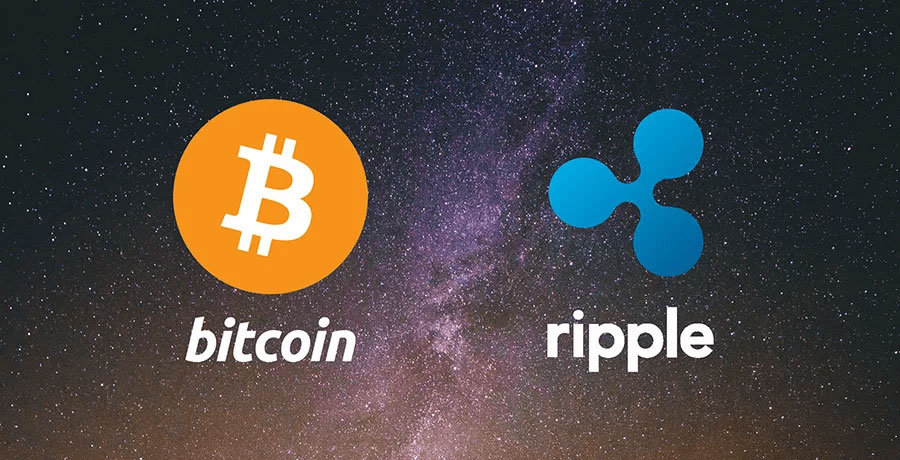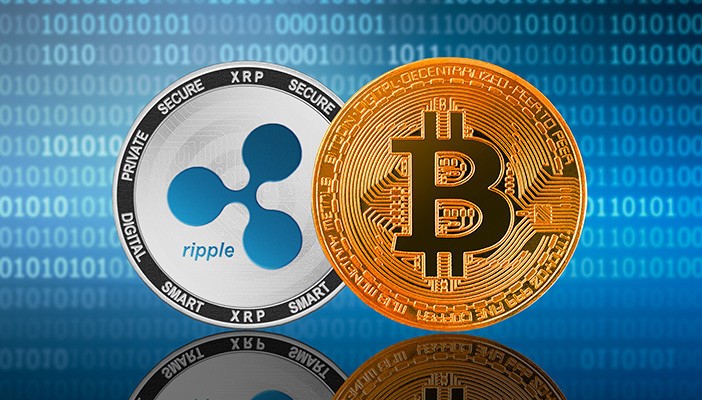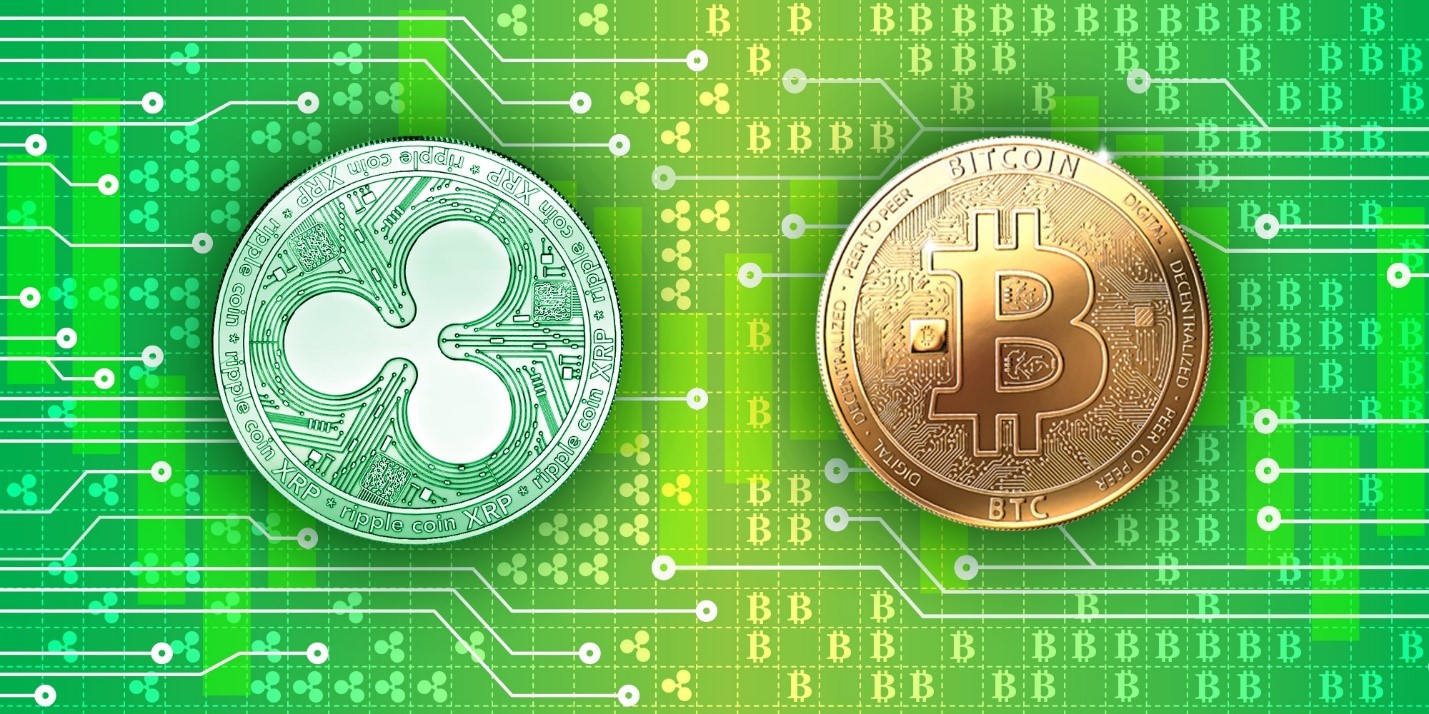There is a lot of hype around the blockchain, cryptocurrencies and distributed ledger as well as much confusion in this universe. From the outside, the crypto investing world seems to be limited to only two cryptocurrencies, Bitcoin and Ethereum because Bitcoin is the most popular and well-known currency and the leader in terms of overall traction with users and market cap. Still, there are several other choices that may be suitable for those investors who wish to diversify their portfolio and maybe experiment with more unique coins with much different concepts than Bitcoin. One of the names that remains in everyone’s mind and keeps coming up is Ripple.

In March of 2021, Ripple – or to correctly refer to it, XRP – ranked 4th in terms of total market cap just behind the mega cryptocurrency Bitcoin, Ethereum and Binance Coin. Since Ripple and Bitcoin keep being mentioned, we are going to break them down individually and take a closer look at the factors that distinguish these two cryptocurrencies from one another and from other digital coins ranked high in the list. So, without further ado, let us get into their differences.
Bitcoin and XRP’s main differences
1. Bitcoin and Ripple have different networks
Now, Bitcoin is a platform based on a public blockchain ledger that is able to support a digital currency which is used as a means of facilitating transactions and trades for goods and services.
The Bitcoin network is mostly built around the concept of blockchain which is a public ledger consisting of validated transactions and records of them. Miners are able to validate the above mentioned transactions on a regular basis and help add them to the blockchain. Now, mining requires time and a lot of computational power. In exchange for the resources put into the process of verifying transactions on the blockchain by the miners is rewarded by Bitcoins when the transactions are successfully verified and added to a Bitcoin block.

On the other hand, we have XRP, the native coin used for the products developed by Ripple. All of their products are designed as a means of payment settlement remittance systems similar to SWIFT – SWIFT is a service developed for security transfer and international money exchanges which is the system utilized by banks and financial institutions – and asset exchanges. Unlike Bitcoin, where you could try and mine for the currency with the proper equipment, XRP is not minable and utilizes a less complicated method than Bitcoin does. In fact, when Ripple developed XRP, they only created 100 billion units of it and this number will not increase and neither will it decrease.
2. Both currencies use different methods for verifying transactions

So, instead of using the concept of blockchain mining like Bitcoin does, the Ripple network has a different way of validating transactions. The way Ripple works is by a unique distributed consensus method in which participating nodes conduct a poll in order to validate the authenticity of each transaction. What this does is that it removes the need for a central authority to verify all the transactions which will make the process much, much faster.
The result is that Ripple’s XRP can still remain decentralized and be a lot quicker than many of its rivals. It also means that the consensus system used by XRP consumes little energy especially when you compare it to Bitcoin. On the other hand, Bitcoin is literally referred to as an energy hog so no explanation is needed.
3. Bitcoin is both slower and more expensive than XRP
Due to the complicated method and the intensive nature of Bitcoin’s mining system, its transaction validation process can take a long time and is also associated with higher transaction fees. On the other side, we have XRP which is able to validate transactions in mere seconds and with very low fees. The thing is, XRP transactions are charged the same way as Bitcoin transactions have processing fees. So, each time a transaction is created on the Ripple network, a small fee (in XRP) is required from the user. Also, it is worth mentioning that by the user, we mean any individual or organization using the network.
4. XRP has more coins
As we have already mentioned in the previous sections of this article, Ripple pre-mined approximately 100 billion units of XRP at the time of the currency’s launch and has been releasing this amount to the market gradually. In contrast, even though Bitcoin has a lot more market cap than Ripple, it is still limited to 21 million coins in the market. This means that Bitcoin’s entire supply is capped at 21 million BTC and will not increase or decrease. Bitcoin’s artificial scarcity has made a lot of investors interested in the potential it has as a store of value.
5. Bitcoin and XRP have different circulation methods
The way Bitcoin works is by releasing its coins and adding to the network; then, the miners compete with one another in order to find these coins first. Bitcoin does not adhere to a certain release schedule and its BTC supply is entirely dependent on the difficulty of the mining algorithms and speed of the network.
On the other hand, XRP’s release is scheduled and is controlled by a smart contract. Ripple has programmed to release 1 billion units of XRP at maximum every month and this is governed by a smart contract integrated in the system.

The Final Takeaway
While Ripple is in fact more complicated than Bitcoin, the points mentioned above mostly explain its basic workings. In short, the system used by Ripple XRP is much more suitable for lower transaction fees and less time required for the process of these transactions. On the other hand, Bitcoin is much more popular than Ripple and is a lot more widespread. This is the reason why Bitcoin has the upper hand in other ways. Bitcoin remains a truly public network without any central authorities controlling it whereas Ripple is owned and controlled by a private company with the exact same name even though it is also considered as a decentralized cryptocurrency.
Ripple and Bitcoin
Digital Currency
Bitcoin Network
Verifying Transactions
Blockchain Mining
Bitcoin’s Mining
Graphic Photo World
Frontend Free Code
Code Free Tutorial
CSS Free Code
PHP Free Code



 Home
Home How to use
How to use Sitemap
Sitemap About Us
About Us Suggested
Suggested Privacy Policy
Privacy Policy